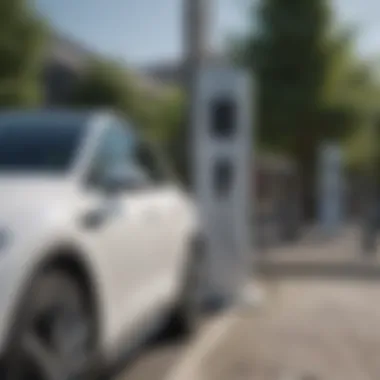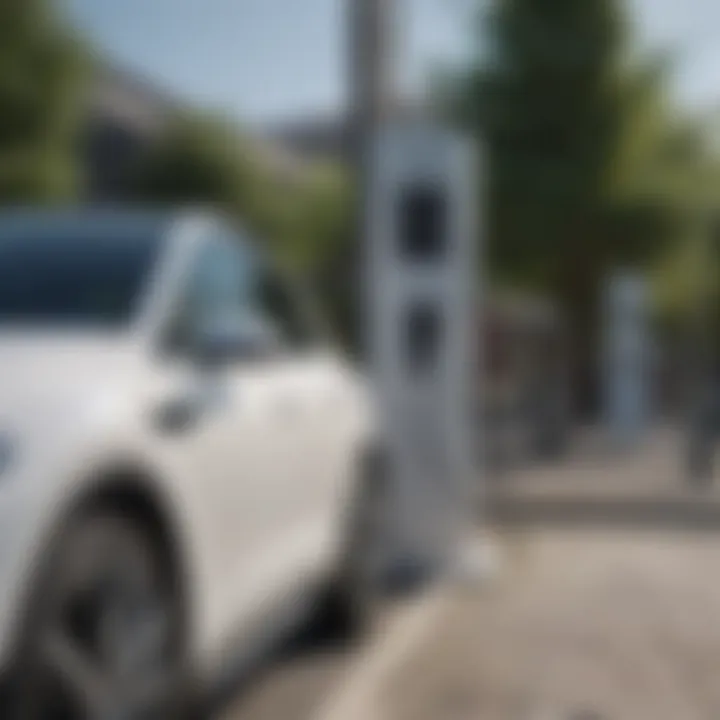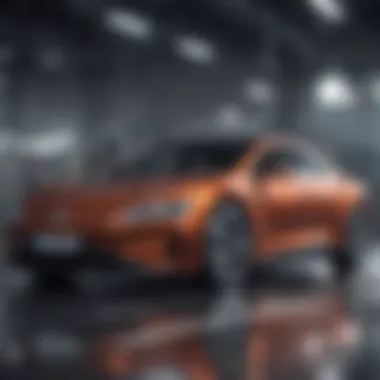Exploring the Mileage Range of VW Electric Vehicles


Intro
In recent years, the automotive landscape has witnessed a seismic shift towards electrification, with various manufacturers rolling out their electric vehicles (EVs). Volkswagen has been at the forefront of this movement, carving a niche for itself within the crowded electric vehicle market. This article digs into the mileage range of Volkswagen’s electric cars, steering through their technical specifications, day-to-day usability, and how they measure against competitive models. It’s not just about the numbers on a spec sheet; it’s about what those numbers mean for real-world driving.
With electrification becoming the talk of the town, understanding mileage—central to any vehicle purchase—holds more weight than ever. As consumers become more discerning, they begin to expect not only reliable performance but also insights into how battery technology and driving conditions impact that performance. Whether you’re a car enthusiast keen on the latest advancements or someone pondering your next vehicle purchase, understanding the mileage dynamics of VW’s electric lineup offers a treasure trove of insights.
Let’s journey through a comprehensive examination, unearthing both the benchmarks and the nuances that define the experience of driving a VW electric car.
Car Reviews
Overview of the Vehicle
The Volkswagen ID.4, which many consider a flagship in VW’s electric lineup, is a compact SUV that captures attention with its modern aesthetics and innovative features. It offers a range of approximately 250 miles on a full charge, making it competitive with models like the Tesla Model Y and the Ford Mustang Mach-E.
In contrast, the ID.3 serves as a more compact hatchback option, appealing to urban dwellers seeking something nimble and efficient. Depending on battery size, it can achieve up to 260 miles, promising that users can zip around town without breaking a sweat over range anxiety.
Performance Analysis
Driving performance is where VW really kicks it up a notch. Equipped with electric motors that yield instant torque, the driving experience feels lively and responsive. For instance, the ID.4 can reach 0-60 mph in roughly 7.5 seconds, which is silghtly brisk for an SUV.
Real-world usage reveals that factors like terrain and weather can affect mileage. Hill climbs or harsh winds can stretch what might be expected on paper. On the flip side, these vehicles also offer regenerative braking, allowing them to harness energy while slowing down or going downhill, a nifty feature that can bolster overall efficiency in various conditions.
Design and Interior Features
The interior of VW electric cars is a blend of functional elegance. The dashboard showcases a contemporary layout, featuring a digital cockpit that lends itself to an intuitive user experience. With ample head and legroom, even taller passengers find comfort in rides.
Cabin materials often incorporate sustainable elements—think recycled plastics—which underscores VW's commitment to eco-friendliness. It’s not just about looks; this design philosophy resonates deeply with the modern consumer, who tends to value sustainability alongside aesthetics.
Safety Ratings and Specifications
Safety is paramount in the automotive realm, and VW doesn’t skimp here. The brand has seen commendable ratings from institutions like the Euro NCAP for models such as ID.4. Incorporating cutting-edge driver-assistance technologies, like adaptive cruise control and lane-keeping assist, the ID lineup provides a comprehensive safety net for drivers and passengers alike.
Value for Money
When weighing price against features, VW electric cars tend to walk a fine line. Models come with a slightly higher price tag than traditional combustion-engine vehicles but provide significant savings over time on fuel and maintenance. With government incentives in many regions, the overall cost of ownership can become favorable, making it easier for buyers to swallow that initial investment.
The electric revolution isn’t just about empowerment; it’s about embracing a holistic approach toward driving and what's under the hood.
Understanding the mileage range, performance implications, and overall value provides a rounded perspective on why many may consider investing in a Volkswagen electric car.
Foreword to Volkswagen Electric Cars
Volkswagen's foray into the realm of electric vehicles marks a significant turning point, not only for the brand itself but for the wider automotive industry. As the world embraces a more sustainable future, understanding VW electric cars offers insights into their innovative efforts to combat climate change and transition away from fossil fuels. This section provides a gateway to grasping how VW stands in the electric vehicle (EV) market, an area that's rapidly expanding and evolving.
The significance of this topic reflects on various elements; from technological advancements in battery life to the overall design and usability of these vehicles. The introduction sets the stage for a detailed exploration of VW's electrified lineup, emphasizing the importance of mileage range. The efficiency that these vehicles deliver is not just a number—it's a critical factor that influences consumer choices. Furthermore, as potential car buyers and automotive enthusiasts dive into the details, they will discover not only what VW offers but also how these features play into their daily lives and driving experiences.
In summary, this introduction serves as a primer to understand Volkswagen's electric journey—encompassing the past, current market positioning, and the road ahead.
A Brief History of VW's Electric Journey
Volkswagen's electric journey is a tale of ambition and adaptation. It all began with the realization that the future of transportation hinged on reducing emissions and moving toward green technology. In the early 2000s, the company began experimenting with electric technology but faced hurdles. It wasn't until the unveiling of the Volkswagen e-Golf in 2014 that they truly stepped onto the scene, showing their commitment to EV development. Its impressive performance, coupled with a familiar design, was a nod to traditional car buyers hesitant to make the leap into something new.
However, the real game-changer came in 2019 with the launch of the ID.3. This vehicle was not just another addition to their lineup; it was the beginning of a new era, introducing VW’s MEB platform specifically designed for EVs. The ID.3 aimed to make electric driving accessible to the masses, offering a balance between performance and efficiency. This marked a pivotal moment, as VW began positioning itself as a major player in the EV market, with ambitions to produce several models under the ID branding.
Current Models and Their Position in the Market
As of now, Volkswagen boasts an electrified roster that includes the ID.3, ID.4, and the upcoming ID. Buzz. Each of these models is tailored to meet different consumer needs. The ID.3 serves the compact segment, appealing to urban drivers and eco-conscious families. Its mileage efficiency is meant to allay concerns about range anxiety, while the spacious ID.4 caters more to those seeking versatility for trips and family outings with its SUV frame. The ID. Buzz, inspired by the iconic Microbus, aims to attract those looking for something with a touch of nostalgia while still being modern and efficient.
In terms of market positioning, VW is striving to balance affordability with sustainability, a strategy that appears to resonate well among consumers—especially as more are turning their attention to cleaner options. With competition from brands like Tesla, Ford, and Hyundai, it's crucial for VW to highlight its unique offerings. The combination of German engineering, brand heritage, and innovative tech is a strong selling point.


"Volkswagen’s commitment to electric cars is not just a trend; it’s a redefined future of mobility aligning with global aspirations for sustainability."
In summary, Volkswagen's electric vehicles are not only shaping the market but also paving the way for future models. As technology continues to develop, so too will the expectation for increased mileage, efficiency, and overall driving experience.
Understanding Electric Vehicle Mileage
Understanding the mileage range in electric vehicles (EVs) is more than just a number on a spec sheet; it’s a fundamental element influencing consumer choice and the overall impact of electric mobility on our environment. The miles an electric car can cover on a single charge can dictate not just where one drives, but also how one plans their journeys—such as how many charging stations they need to consider on a road trip.
In the world of electric vehicles, mileage range serves multiple roles:
- Consumer Confidence: As electric cars continue to gain traction among drivers, potential buyers are looking for assurances about performance. Knowing the mileage range can either encourage or dissuade consumers considering a switch from traditional combustion engines.
- Environmental Impact: A higher mileage range often translates to lesser energy consumption per mile. This efficiency can contribute to reduced environmental strain, appealing to eco-conscious consumers.
- Market Positioning: Automakers, like Volkswagen, leverage mileage as a selling point. Highlighting superior range can distinguish their models from competitors and encourages consumer loyalty.
Through this lens, we can dive deeper into the specifics of what mileage range means in electric vehicles.
Defining Mileage Range in Electric Vehicles
Mileage range in electric vehicles refers to the distance the car can travel on a fully charged battery. It's commonly expressed in miles or kilometers and varies widely depending on several factors, including battery size, vehicle weight, and powertrain efficiency. For electric car buyers, this figure acts as a critical yardstick when comparing models.
For instance, a VW ID.4 offers approximately 250 miles of range, while other competitors may boast different standards, pushing the limits of what consumers expect. Understanding these variations helps potential buyers select a model that best suits their lifestyle and driving habits.
Several factors contribute to defining this mileage:
- Battery Capacity: Measured in kilowatt-hours (kWh), battery size can play a big role in how far a vehicle can travel. A larger battery tends to offer more mileage.
- Drive Cycle: Various test cycles reflect real-world driving conditions. These can include city versus highway driving, each affecting energy consumption differently.
- Technology: Innovations in battery technology and energy management systems continually change the equation. For instance, VW's use of cutting-edge software helps optimize energy usage, extending the effective mileage.
Importance of Mileage Range for Consumers
The mileage range is a vital criterion for many interested in electric cars, as it influences their decision-making process. Here are a few reasons why mileage is crucial:
- Psychological Barriers: Range anxiety, the fear of running out of charge, is real for many potential EV buyers. A high mileage range can alleviate these concerns, making the transition to electric vehicles feel more manageable.
- Daily Driving Needs: For individuals with commutes or specific travel routines, a reliable mileage range can ensure their vehicle meets daily demands without frequent charging stops.
- Long-Distance Travel: Those who frequently embark on road trips need to consider mileage range critically. A vehicle with an adequate range means less time spent charging and more time enjoying the open road.
"The mileage range is more than numbers on a page; it’s about confidence in the vehicle's performance and planning practical use."
In summary, the importance of mileage range in electric vehicles cannot be overstated. For companies like Volkswagen, recognizing the mileage needs of their consumer base can significantly shape their product offerings and marketing strategies in the burgeoning EV market.
VW Electric Car Battery Technology
The backbone of an electric car's performance lies in its battery technology. Within the ever-competitive market of electric vehicles, Volkswagen has made significant strides to enhance its battery engineering. At its core, battery technology influences factors such as mileage range, charging time, and overall lifespan of the vehicle. This section aims to shed light on the specific elements of VW’s battery technology that benefit consumers and also considerations potential buyers should keep in mind.
Types of Batteries Used in VW Vehicles
When it comes to VW’s electric models, the company predominantly utilizes lithium-ion batteries. These batteries are known for their energy density and longevity compared to older technologies like nickel-cadmium batteries. One might think, "Okay, lithium-ion is standard these days, so what’s the catch?" Well, it’s about how Volkswagen is optimizing those cells to push the performance envelope.
- Modular Design: VW employs a modular battery design, allowing effective use of space within the vehicle. This design not only helps with saving weight but also enhances the thermal management of the battery cells, improving efficiency.
- Range Options: Different models, such as the ID.3 and ID.4, come with varying battery capacities. For instance, the ID.4 features a larger battery pack providing a range reaching up to around 250 miles on a single charge, depending on the specific configuration.
This variability in battery type and capacity across VW electric models aims to cater to a wider audience, appearing both attractive to those who may drive longer distances and those who are more urban-focused.
Charging Infrastructure and Battery Life
The convenience of owning an electric vehicle doesn’t solely rest on the battery technology; it intertwines significantly with charging infrastructure. Volkswagen has made efforts to improve the charging experience for their users through various initiatives.
- Wide Network of Charging Stations: With partnerships like Ionity, VW electric cars benefit from access to fast-charging stations across Europe—enabling drivers to recharge quicker than ever. Some owners might find themselves plugged in for about 30 minutes to replenish substantial range.
- Home Charging Solutions: Moreover, VW promotes home charging stations for consistent daily use. This feature can be particularly beneficial for those who tend to travel short distances regularly.
Battery longevity is paramount. To fend off concerns regarding battery degradation, VW has incorporated advanced battery management systems. This system ensures optimal usage patterns, helping extend the lifespan of their batteries, often estimated at around 8 years or 100,000 miles.
"Better battery technology and robust charging infrastructure may just be the keys to making electric vehicles mainstream."
Tu sum up, innovative battery tech is a large part of why VW is standing out in the electric car market.
Factors Influencing Mileage Range


Understanding the factors that influence the mileage range of Volkswagen electric cars is essential for potential buyers and automotive enthusiasts alike. Mileage range is more than just a number on a specification sheet; it’s a window into the overall efficiency of a vehicle. Several elements come into play here, from environmental conditions to how drivers choose to operate their cars. Recognizing these influences can help consumers make informed decisions when selecting their electric vehicle, ensuring that their choice aligns with their specific driving needs.
Environmental Conditions and Mileage Performance
The environment in which a vehicle operates can drastically affect its mileage performance. Temperature, terrain, and even weather conditions can play a significant role in determining how far you can drive your VW electric car on a single charge.
- Temperature: Extreme cold or heat can drain the battery quicker. Cold weather can halve the mileage in certain cases because the battery has to work harder to keep the vehicle heated.
- Terrain: Hilly terrains require more energy for climbing, thereby reducing range. On the flip side, driving downhill can sometimes assist in extended mileage through regenerative braking.
- Weather Conditions: Heavy rain, wind, or snow can also hamper the efficiency of electric vehicles. Increased drag from the wind or additional energy requirements for heating and defrosting can contribute to a lower mileage output.
"Drivers should consider their local climate and typical driving conditions when assessing potential mileage ranges."
Driving Behavior and Its Impact on Efficiency
The way individuals drive their electric cars is crucial to maximizing mileage range. Acceleration, speed, and driving patterns all contribute to how effectively the vehicle uses its battery power.
- Acceleration Habits: Frequent rapid acceleration can deplete battery power quickly. Gradual acceleration allows the vehicle to use energy more efficiently.
- Cruising Speed: Maintaining a steady speed, especially at moderate speeds, helps in conserving battery life. High speeds may increase drag, which impacts mileage adversely.
- Use of Regenerative Braking: VW electric vehicles come equipped with regenerative braking systems. Drivers who utilize this feature effectively can recapturing energy during braking, thus extending their driving range.
Weight, Aerodynamics, and Mileage Considerations
The physical characteristics of the vehicle also play a vital role in how far it can travel on a single charge. Factors like weight and aerodynamics are crucial in shaping the efficiency of electric cars.
- Weight: More weight requires more energy to move, therefore heavier vehicles tend to consume more battery power. VW designs, like the ID.4, are crafted to be as lightweight as possible while maintaining structural integrity.
- Aerodynamics: A streamlined design reduces drag. The sleeker the vehicle, the better it can cut through the air, which in turn can lead to better mileage. Features like smooth shapes and lower profiles are essential in this aspect.
- Tire Pressure: Regular checks on tire pressure are important too. Under-inflated tires can increase rolling resistance, negatively affecting efficiency.
These factors encompass a varied yet interlinked approach to understanding mileage range. When potential buyers consider these aspects, they gain not only a clearer picture of VW electric vehicles but also a deeper comprehension of the overall electric vehicle landscape.
Comparative Analysis of VW Electric Models
A thorough examination of Volkswagen's electric vehicles involves a comparative analysis of their models against those of competitors. This analysis not only highlights VW's strengths and weaknesses in the electric vehicle market but also provides invaluable insights for potential buyers. By evaluating mileage range, performance, and technological aspects, consumers can make better-informed decisions that align with their individual requirements and expectations. The growing focus on electric vehicles means that the stakes have never been higher, making this analysis critical for understanding the competitive landscape.
Comparing ID. Mileage with Competitors
Volkswagen's ID.4 has positioned itself as a significant player in the electric SUV category. When comparing its mileage range with competitors like the Ford Mustang Mach-E or the Tesla Model Y, several considerations come into play. The ID.4 offers a WLTP-certified range of up to 520 km (about 323 miles) on a full charge, which is competitive, though not the highest in this crowded segment.
One standout feature of the ID.4 is its efficiency in urban environments. Many drivers report real-world mileage that often exceeds official ratings thanks to regenerative braking, reducing their dependence on charging infrastructure. This feature makes the ID.4 a compelling choice for city dwellers who also venture on long-distance trips.
However, it’s crucial to note that real-world mileage can be subject to many variables such as terrain, driving style, and weather conditions. In contrast, the Tesla Model Y often showcases a mileage range above the ID.4, especially in ideal driving conditions, thanks to its advanced aerodynamics and weight distribution. Thus, it often comes down to individual preferences; practicality versus the ultimate range.
Performance Analysis of ID. versus Rivals
Shifting gears to the ID.3, Volkswagen's compact electric car has attracted attention for its balance of affordability and performance. Its range hovers around 400 km (about 248 miles), which is respectable for a city-focused EV. In performance terms, the ID.3's acceleration is brisk, catching up with rivals like the Nissan Leaf and the Hyundai Kona Electric.
The driving dynamics of the ID.3 are tailored for a nimble urban experience. Its lightweight design combined with a sophisticated electric powertrain allows for seamless handling, making it a joy to drive in crowded areas. When compared to the Leaf, which is known for its smooth but less thrilling driving experience, the ID.3 ends up feeling more engaging.
Still, where the ID.3 might shine in performance, it faces tougher competition in mileage from rivals that offer longer ranges without sacrificing too much efficiency. As electric vehicle technology advances, firms are continually pushing the boundaries of what drivers can expect. Future iterations of rival models may threaten ID.3's market share, emphasizing the importance of continuous improvement at Volkswagen.
"An informed comparison not only helps consumers make choices but also guides manufacturers in understanding market demands."
In summary, these analyses reveal a lot about where VW stands in the current electric vehicle market. As the competition intensifies, both the ID.4 and ID.3 are set to evolve, responding to consumer needs while contending with innovative rivals.
Real-World Mileage Reports from VW Electric Owners
Understanding how VW electric cars perform in daily use is crucial for potential buyers and enthusiasts alike. Real-world mileage reports give insight into what drivers can truly expect, beyond the specs provided by manufacturers. This aspect has gained importance as technology in electric vehicles continues to evolve quickly. Mileage isn’t merely a figure on a spec sheet; it embodies users’ experiences and satisfaction levels. By tapping into owner testimonials, we gain a clearer picture of aspects such as battery performance, driving conditions, and overall efficiency that can vary from one individual to another.
Owner Testimonials on Mileage Efficiency
Owner testimonials provide a rich vein of information regarding the practical efficiency of VW electric cars. For instance, many ID.4 owners have shared their experiences driving through various terrains, climates, and urban environments, which serve to highlight how real-world conditions affect mileage.
- “I’ve taken my ID.4 on weekend trips, and I usually get about 270 miles on a full charge. But in cold weather, I notice that suddenly drops.”, mentions a user from Minnesota, emphasizing how temperature can significantly impact performance.
Furthermore, other owners have noted charging habits and how they play a role in overall mileage. One owner found, “Charging every night at home makes a big difference. I rarely hit below 200 miles, even on longer days.” This emphasizes the model’s flexibility in adapting to owners’ routines and environments.


The takeaways from these personal stories reveal a spectrum of performance but mainly point to a few consistent themes: how charging habits, environmental factors, and driving styles influence the efficiency of VW electric vehicles.
Analyzing Variance in Reported Mileage
Notably, the variance in reported mileage among VW owners must be scrutinized carefully. While one might expect all ID.4s and ID.3s to achieve similar ranges based on specifications, real-world tests unveil a different narrative.
Several factors contribute to discrepancies:
- Driving Behavior: A spirited driver can burn through battery faster than a more conservative one.
- Terrain: Hill-driven routes tend to yield lower mileage compared to flat, urban environments.
- Temperature: As mentioned, weather plays a pivotal role, with extreme cold or heat drastically reducing mileage efficiency.
Research suggests that some users report mileage as low as 180 miles depending on conditions, while others claim they can stretch well over 300 miles.
"Understanding these variances can often determine whether a VW electric car suits your unique lifestyle. It becomes essential to consider personal driving patterns alongside manufacturer claims." - Anonymous owner
Ultimately, gathering owner testimonials and analyzing the variances in reported mileage allows prospective buyers to set realistic expectations. They can assess whether VW's electric offerings align with their individual driving needs. As the landscape of electric vehicles matures, these real life accounts remain invaluable for informed decision-making.
Future of VW Electric Vehicles
The trajectory of Volkswagen's electric endeavors is certainly fascinating, considering the current automotive landscape that's becoming more and more electrified. The future of VW electric vehicles isn’t just pertinent to the brand itself, but it resonates with broader environmental sustainability, consumer choices, and technological progress. This section paints a picture of what’s ahead for VW and implicates all these elements for potential buyers and automotive aficionados alike.
As VW continues to innovate and expand its electric lineup, factors such as environmental regulations and market demands increasingly dictate how they strategize their offerings. The mileage range of electric cars plays a pivotal role in consumer acceptance. Without adequate range, skepticism lingers, and adoption can falter. Therefore, VW's future, especially regarding mileage efficiency, is central to its success.
Upcoming Models and Projected Mileage Ranges
Volkswagen has some exciting models lined up that not only promise innovation in styling and tech but also have significant projections in mileage range. One noteworthy vehicle set to hit the market is the ID. Buzz, which is anticipated to deliver a mileage of around 300 miles on a single charge. This model is positioned to cater to families while also embracing the retro aesthetics that pay homage to the classic VW buses.
Another exciting upcoming model is the ID.5, which is based on the ID.4 but with a sportier design and enhanced performance capabilities. It aims to achieve similar ranges while boosting the experience with improved traction and handling. Expect the ID.5's range to be comparable, aiming towards that coveted 300-mile mark as well.
- ID. Buzz: Estimated range of 300 miles
- ID.5: Projected to match the ID.4’s range, around 250 to 300 miles
These models are part of VW's strategy to create a comprehensive roster that can suit varying preferences and needs while adhering to the growing demands for electric mobility. Consumers are looking closely at these projected ranges, weighing them against their driving habits.
Technological Advancements on the Horizon
The advancements in battery technology and charging infrastructure are crucial to understanding the future of VW electric cars. VW is investing substantially in research and development, focusing not only on enhancement of battery life but also charging speed. The next generation of batteries may have solid-state technology, which theoretically allows for larger energy density, thus translating to longer ranges with faster charging times.
On the charging front, the development of quick-charging stations is a crucial element. VW has initiated projects to facilitate fast-charging networks across key locations, ensuring drivers won't find themselves waiting hours for a recharge. This will significantly impact the real-world mileage perception and usability of VW electric cars.
"With robust infrastructure and next-gen technology, the mileage potential for VW electric vehicles could redefine user experience."
In addition, with a keen focus on software updates, VW plans to optimize the vehicles post-sale. Like a smartphone, regular updates can fine-tune performance, potentially improving mileage efficiency over time.
Epilogue
The exploration of mileage range in Volkswagen's electric vehicles is not merely a technical assessment; it's about understanding how these figures resonate with consumers and their driving realities. The importance of this topic hinges on several core elements that collectively shape how potential buyers perceive and engage with VW’s electric offerings.
The mileage range fundamentally affects the usability of an electric vehicle. If consumers believe an EV can't meet their travel needs without excessive range anxiety, they are less likely to consider a brand—regardless of how cutting-edge the technology may be. Knowing that VW is committed to improving its mileage range speaks volumes to eco-conscious buyers who look for practicality alongside environmental benefits.
Summarizing VW's Place in the Electric Vehicle Landscape
Volkswagen's entry into the electric vehicle domain has been marked by strategic innovation and robust marketing efforts. The growing lineup, particularly models like the ID.4 and ID.3, illustrates a serious commitment to competing in the electric space effectively. In a marketplace crowded with new entrants and established brands alike, VW stands out due to its established automotive pedigree and gradual yet steady progress in electric mobility.
As competition heats up, VW’s current position becomes clearer—the brand is merging traditional automotive values with modern demands. Their focus on developing battery technology, alongside extensive charging networks, reflects an understanding of what it takes to stay relevant in the evolving landscape. VW needs to maintain a balance between tradition and innovation, ensuring their electric vehicles not only look good but also perform adeptly on the mileage front.
The Implications of Mileage Range for Future Designs
The implications of mileage range for future designs are significant and multifaceted. As automotive technology advances, consumers are becoming more educated about what constitutes a decent range. Therefore, VW must prioritize incorporating battery efficiencies and improved aerodynamics in their design processes. Moreover, the concept of range is evolving—it's not just about maximum potential; it’s also about real-world usability.
Considering the environmental ethos that many consumers adopt today, VW's strategies must also align with sustainability principles. Options for renewable energy in charging infrastructure and recycling endeavors for used batteries can play into their narrative of responsible innovation.
Going forward, VW should be keenly aware that mileage range will not only dictate consumer satisfaction but also shape industry standards. By pioneering advancements in mileage efficiency, VW positions itself not just as a manufacturer but as a leader defining how electric mobility unfolds in the years to come.
"The future of electric vehicles hinges on an empathetic understanding of consumer needs, particularly regarding mileage range, as this will define market leadership and innovation."
In summary, as VW navigates this dynamic landscape, the emphasis on mileage efficiency serves as an essential lens through which future designs and consumer relationships can be understood.







